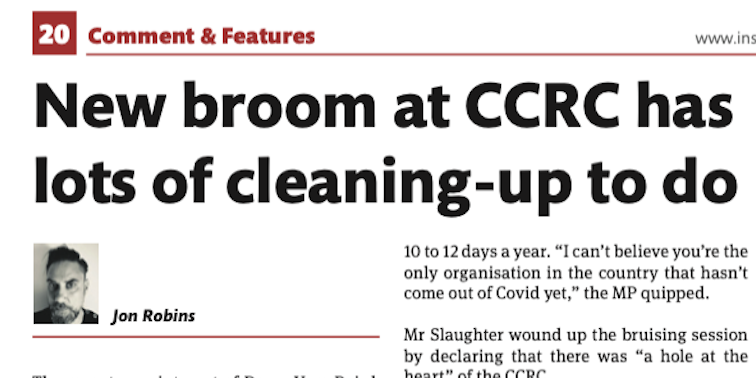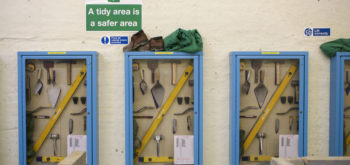The recent appointment of Dame Vera Baird KC as the new interim chair of the Criminal Cases Review Commission (CCRC) hopefully marks the end of a prolonged period of chaos at the beleaguered miscarriage of justice watchdog. This article features in the August Issue of Inside Time
 A sense of drift was not been helped by the lack of a chair at the Birmingham-based group since Helen Pitcher stood down in January. Her departure was a belated response to a highly critical report published six months earlier into the CCRC’s mishandling of the case Andrew Malkinson case by Chris Henley KC.
A sense of drift was not been helped by the lack of a chair at the Birmingham-based group since Helen Pitcher stood down in January. Her departure was a belated response to a highly critical report published six months earlier into the CCRC’s mishandling of the case Andrew Malkinson case by Chris Henley KC.
Andrew Malkinson had his conviction overturned two years ago, having spent 17 years wrongly imprisoned for a rape he didn’t commit. That he cleared his name was no thanks to the CCRC which was set up as the justice system’s safety net some 28 years ago. The watchdog had previously rejected Malkinson’s application twice. The Henley review turned up internal documents showing that as recently as 2022 the CCRC contemplated rejecting it a third time despite the ‘compelling’ DNA evidence that was to clear his name.
When Helen Pitcher did finally depart – after having ignored calls from the Lord Chancellor, Shabana Mahmood – she insisted that she was the victim or, as she put it, had been made ‘a scapegoat’. ‘A head had to roll, and I was chosen for that role,’ she said. It was a shocking insensitive complaint; but consistent with her refusal to take responsibility for the commission’s multiple failings which prolonged the wrongful conviction of Andrew Malkinson by as many as 14 years.
Helen Pitcher’s graceless exit has now been followed by the resignation of chief executive Karen Kneller. In Pitcher’s extraordinary resignation statement, she dumped on her number two by revealing that she had received ‘advice from departing commissioners to remove the senior management team’ when she joined the CCRC in 2018.
I attended a trainwreck meeting between Kneller (together with head of casework Amanda Pearce) and MPs in a one-off session of the House of Commons’ justice committee. The committee chair Andy Slaughter was clearly shocked by the revelation from Kneller that it’s two most senior members of staff came into the office ‘maybe one or two days every couple of months’. ‘Who is actually running the organisation?’ Slaughter asked.
The watchdog introduced a remote working policy during the pandemic but, unusually, have stuck with it ever since – staff are only expected to be present in its offices for 10 to 12 days a year. ‘I can’t believe you’re the only organisation in the country that hasn’t come out of Covid yet,’ the MP quipped.
Andy Slaughter wound up the bruising session by declaring that there was ‘a hole at the heart’ of the organisation. ‘If I went into your head office, I wouldn’t find any senior management there. I wouldn’t find any caseworkers there.… If I was your chief executive, I would be in every day. I would be asking my staff to be there. I’ll be trying to rebuild the organisation.’
There was more. The committee received correspondence from Chris Henley as well as a communications consultant called Chris Webb who had been hired by to deal with the fallout of Malkinson; both took issue with the account Kneller gave to the MPs. ‘Karen Kneller misled Parliament,’ Henley told the Sunday Times.
Kneller has since resigned.
The problems of the CCRC are complex. They did not start with the appointment of Helen Pitcher. It was her predecessor, Richard Foster, who presided over a period of (to quote a High Court ruling from 2022) ‘dysfunction’ and ‘political interference’ which I believe fatally undermined the group.
As Inside Time readers will not need reminding, the recent unedifying shenanigans at the CCRC obscure structural problems that have effectively defanged the watchdog – over the years it has become an increasingly cautious organisation, starved of funding by successive governments and emasculated by the courts.
This is evident in the collapse number of referrals. According to the academic Dr Steve Heaton, the CCRC has referred 227 cases in the last eight years. He argues that the commission’s ‘successes’ are overstated because those numbers are inflated by ‘group referrals’ (for example, the Post Office Horizon cases) – often cases where the commission has had little involvement. Taking that into consideration, he estimates that just 16 cases have been overturned due to the CCRC’s investigative efforts in the last eight years.
That’s shocking. Helen Pitcher and Karen Kneller consistently downplayed the significance of falling referrals. In Pitcher’s first public communication in 2018, she insisted that the referrals were ‘not the be all and end all’ – hardly reassuring if you’re banged up for something you didn’t do.
Fixing the CCRC will not be magically achieved by changing personnel; any more than it would be by adequately funding the cash-strapped organisation or scrapping its much criticised ‘real possibility’ statutory test (the CCRC can only refer those cases which it considers have a ‘real possibility’ of being overturned by the courts).
That’s not to say that the above doesn’t need not be done. It does.
In the meantime, welcome Dame Vera. Her impressive CV – campaigning defence lawyer, government minister, victims’ commissioner, etc – suggests she is not afraid of a challenge. She’s certainly got one on her hands.
Support the Justice Gap, buy PROOF






